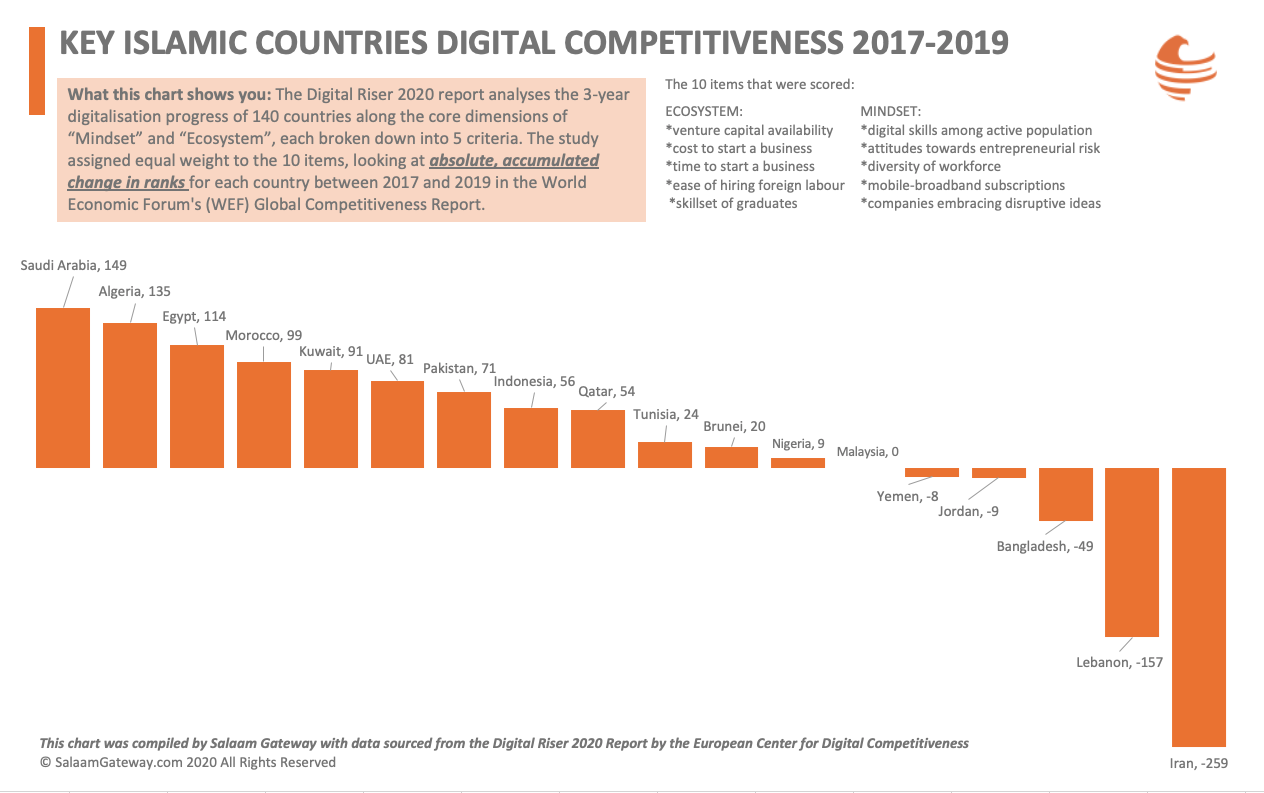Saudi Arabia, Indonesia among G20 top risers in digital competitiveness, global study finds

Saudi Arabia was named the top digital riser within the Group of 20 (G20), according to a study by the European Center for Digital Competitiveness. France follows in second, Indonesia in third place.
The Digital Riser 2020 report analyses the three-year digitalisation progress of 140 countries along the core dimensions of “Mindset” and “Ecosystem”, each further broken down into five criteria. It builds upon data from the World Economic Forum’s (WEF) Global Competitiveness Report supplemented with individual country policy reviews.
“As the examples of Saudi Arabia and Indonesia show, the most critical factor in a country’s digital transformation is having a clear plan and implementing it consistently,” Prof. Dr. Philip Meissner of the ESPC Business School told Salaam Gateway.
Dr. Meissner is the Academic Director of the Strategy and Digital Business Master’s programme at the over 200-year-old academy with campuses in Berlin, London, Madrid, Paris, Turin, and Warsaw. ESCP founded the European Center for Digital Competitiveness, intending to bring the topic to the political and public debate.
At the launch of the report in early September, Dr. Meissner said that the world is “in the middle of a digital revolution that is very likely being accelerated by the COVID-19 pandemic”.
“The way that governments manage and navigate this transition will significantly determine how competitive and prosperous their countries will be in the decades ahead,” he added.
SAUDI ARABIA
Two lighthouse initiatives — the “ICT Strategy 2023”, launched in 2018, and “Saudi Vision 2030”, the framework to move the Kingdom’s dependence away from oil and diversify its economy, drive Saudi Arabia’s performance.
The transformation into a digital and technological powerhouse rests upon knowledge enhancement, R&D promotion in the start-up ecosystem, and mega-developments like NEOM.
This smart city project, announced in 2017, is backed with $500 million government support. At the end of July 2020, NEOM’s CEO Nadhmi Al Nasr announced that local firm stc would deliver an advanced 5G and IoT network.
“NEOM’s infrastructure will utilize AI, robotics, and human-machine fusion to deliver greater predictive intelligence and enable faster decision making across all NEOM sectors,” Al Nasr said.
“The procurement and deployment of a future-proof wireless network are a critical first for NEOM in realising our goal of driving innovation in the future digital economy.”
The government’s establishment of the Saudi Arabian General Investment Authority (SAGIA) to accelerate granting investor and entrepreneur licenses and the Saudi Venture Capital Company (SVC) launch with funding worth $1.33 billion in 2018 helped move digitalization forward.
So did the Saudi Arabian Monetary Authority, that introduced low-value contactless payment service to advance digital transactions and e-commerce.
|
What do the top Digital Risers have in common?
|
INDONESIA
In Indonesia, government agencies support investments and programmes like the “1,000 start-ups movement”, which was launched in 2016 and extended to more cities in 2019, to boost innovation and research.
The goal of growing 1,000 start-ups with a valuation of $10 billion by 2020 may have been overly ambitious, though, despite specialised sectors and firms attracting considerable funding.
In 2019, the country’s AgriFoodTech sector bagged $165 million, the second-highest investment in the ASEAN region after Singapore with $177 million, reports AG Funder. The logistics platform Waresix, founded in 2017, has raised $100 million since the beginning of the year, according to Crunchbase.com.
Last year, the Indonesian government invested $7.7 million into a digital talent scholarship programme to provide certifications to 20,000 digital talents, states the Digital Riser Report.
Indonesia also increased its focus on providing high-speed internet across the country. The construction of an optical fibre network is considered vital to improve download speeds. The country has a mobile download speed of just 19.94 Megabytes per second (mbps), which compares poorly to Middle East countries.
According to Speed Test’s global index, Saudi Arabia’s mobile internet speed has jumped by five places to fifth position worldwide in July 2020, increasing the average mobile download speed to 71.73 mbps. UAE leads the world with 110.90 mbps.
PERFORMANCE OF KEY ISLAMIC COUNTRIES
Key Islamic countries did comparatively well as a whole, with twelve out of 18 improving their relative digital competitiveness. Many of the nations improved better than the two digital superpowers, the USA and China.
The authors’ investigation shows that China gained in digital competitiveness (+50) while the United States actually lost strength in the last three years (-33).
Globally, the Seychelles (+277) and the Philippines (+190) made the most improvements.
Among the key Islamic countries, Morocco and Saudi Arabia improved the most in the ecosystem and mindset dimensions, respectively. Iran’s decline was driven by the ecosystem dimension, while it also scored poorly on mindset.
In 2020, the Algerian government announced the creation of “the City of Startups”, a multi-service technology centre. In 2018, the North African nation announced a law that made electronic payment terminals obligatory for all shop owners in the country.
Egypt said it wanted to build up to 4,000 youth centres around the country, to provide training to develop human capacities around digital transformation, and Pakistan launched the Digital Pakistan Vision in 2019.
“This is the most important thing for Pakistan right now, especially its youth,” Pakistan’s Prime Minister commented on the project.
LESSONS TO BE LEARNT
“The main thing is to continue to implement the projects that have already started and to react to new developments,” Dr. Meissner said about the next steps of Saudi Arabia’s and Indonesia’s digital transformation.
“Examples of this could be larger investments in AI, quantum computers, or virtual and augmented reality.”
Indonesia is already building on its momentum of improvements from 2017 to 2019. It released its national Artificial Intelligence strategy in August that is meant as a guide for the country up to the year 2045.
Saudi Arabia also has its own national AI strategy, approved by the King in early August, that is expected to contribute an estimated 500 billion riyals ($133.33 billion) to GDP by 2030.
(Reporting by Petra Loho; Editing by Emmy Abdul Alim emmy.abdulalim@salaamgateway.com)
© SalaamGateway.com 2020 All Rights Reserved
